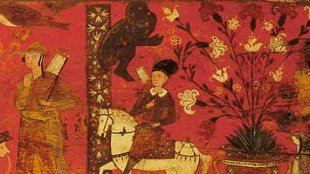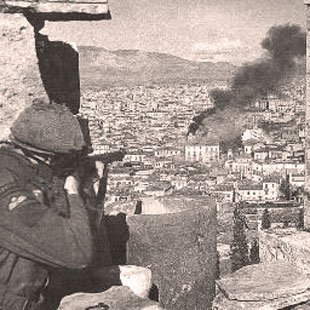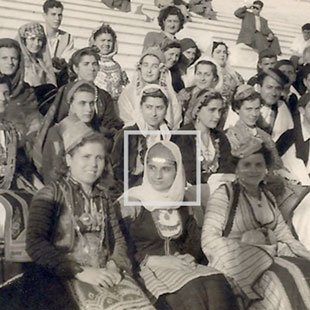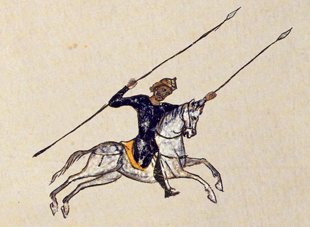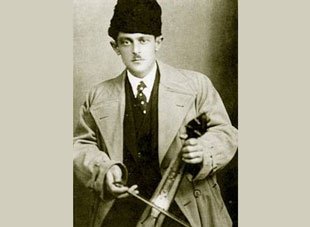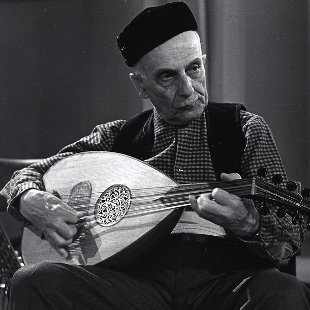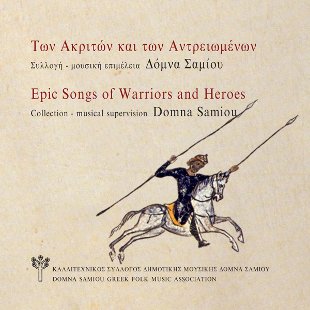You are at: Home page Her Work List of Songs By Command of the King
The Song of Porphyris
Ο βασιλιάς διάταξε
Listen
Lyrics
The king commanded
every fair maid and every brave lad
in every vilayet to gather before him.
And when the fair maids and brave lads heard the news
they gathered before the king, who said:
- Who is worthy and strong enough to capture Kostantis?
Not one of them spoke out, not one of them replied
until a young fellow, a short little slip of a man,
stepped forward and said:
- I am worthy and strong enough to capture Kostantis,
but I'll need a thousand to the right of me, and a thousand to my left
a thousand more behind to make them three,
and to capture Kostantis - what a joyous occasion it will be!
[They set off to find Kostantis and they praised for luck
to go find Kostantis fast asleep,
with his black steed grazing, no swords around his waist.
And what do you know! They did find him fast asleep,
with his black steed grazing, no swords around his waist.
They seized him, they bound him hand and foot,
they bound his arms with a seven-fold chain,
wound a sash seven times around his eyes,
lifted a millstone upon his shoulders
and set off to take him to the king.
When they were half way there, Kostantis stopped in his tracks.
- Let's halt a while, boys, I have something to tell you.
Take me where 'er you will,
just don't lead me through the alleys of my beloved's town.
And what do you know! They led him through the alley of his beloved's town
and his love spied him through her window up on high
and she asked him:
- Kostantis, didn't I tell you not to boast so,
for the king has his hounds and he's set them on you?
- Don't you cry and weep, my love.
We'll leave the narrow places and enter the meadows,
and you'll see then what sort of a man your Kostantis is,
then you'll see how brave men are.
As soon as they left the narrows and entered the meadows,
he blinked and the sash ripped in two,
he shrugged and the millstone flew off his shoulders,
he waved his arms and the chain shattered.
Then he grabbed the sword from the Turk, the horsemen's leader
and called sweetly for his black steed and caressed him.
- Black, will you swim in blood with me?
- Yes, master, I will swim in blood.
But wind a sash seven-fold around my head,
so I do not hear the thunder and lose my way.
Like a hawk he dived down and like an eagle he soared up.
He killed a hundred with his first blow, two hundred with his second
and when he drew back to strike again, there was no one left to smite.
Then he went to the king and told him sweetly:
- If you have any more sheep, send them my way and I'll shear them,
and I've sharp scissors to mark them for you.]
Translated by Michael Eleftheriou
Original Lyrics
Ο βασιλιάς διάταξε
Του Πορφύρη
Ο βασιλιάς διάταξε σ' όλα τα βελαγέτια,
σ' όλα τα βε- σ' όλα τα βελαγέτια,
να μαζευτούνε οι γ-έμορφες κι όλα τα παλικάρια
κι όλα τα πα- κι όλα τα παλικάρια.
Σαν τ' άκουσαν οι έμορφες κι όλα τα παλικάρια,
όλοι συναντηθήκανε κι ο βασιλιάς τους λέει.
- Ποιος ειν' αξός και δυνατός τον Κωσταντή να πιάσει;
[Κανείς δεν απ'λογήθηκε, κανείς δεν απαντάει,
μόν' ένας μικρός,
ένας κοντός, κοντούκικος [και μικροκαμωμένος],
βγήκε και τον απήντησε.
- Εγώ 'μαι αξός [και δυνατός] τον Κωσταντή να πιάσω,
μόν' θέλω χίλιοι από τη μια και χίλιοι από την άλλη
και χίλιοι καταπόδι μου να γίνουν τρεις χιλιάδες,
να πιάσουμε τον Κωσταντή, χαρές και νοστιμάδες.
Ξεκίνησαν και πα να βρουν τον Κωσταντή στον κάμπο,
να παν να βρουν τον Κωσταντή στον ύπνο να κοιμάται,
να 'χει το μαύρο στη βοσκή και τα σπαθιά βγαλμένα.
Έννοια σ' και τονε βρήκανε στον ύπνο και κοιμόταν,
ο μαύρος του ήταν στη βοσκή και τα σπαθιά βγαλμένα.
Τον πιάνουνε, τον δένουνε τα χέρια και τα πόδια,
τον δένουνε τα χέρια του μ' εφτάδιπλη 'λυσίδα,
τον δένουνε τα μάτια του μ' εφτάδιπλο ζουνάρι,
τον βάζουν και στους ώμους του τού μύλου το λιθάρι
και τότες εξεκίνησαν στο βασιλιά να πάνε.
Όταν έπιασαν τα μισά ο Κωσταντής εστάθη.
- Για σταματήστε, ρε παιδιά, κι εγώ να σας μιλήσω.
Όπου θέλτε πηγαίντε με κι όπου θέλτε με πάτε,
μόν' της αγάπης τα στενά δε θε να με περνάτε.
Έννοια σ' και τον περνούσανε απ' το στενό τ'ς αγάπης,
εβγήκε η αγάπη του απ' τ' αψηλό κανάτι1.
Και τότες τον απήντησε.
- Δε σου 'πα εγώ, ρε Κωσταντή, να μη πολυκαυχιέσαι
γιατ' έχει ο βασιλιάς σκυλιά, τα βάζει και σε πιάνουν.
- Έννοια σ', αγάπη μου, μην κλαις, μην κλαις και μη χτυπιέσαι,
θα βγούμε μέσα στα στενά, θα πιάσουμ' τα λιβάδια,
τότε θα δεις τον Κωσταντή, πώς είν' τα παλικάρια.
Μόλις βγήκαν απ' τα στενά και πιάσαν τα λιβάδια,
σαλεύει μια τα μάτια του και κόβει το ζουνάρι,
σαλεύει και τους ώμους του και ρίχτει το λιθάρι,
σαλεύει και τα χέρια του και σπάει την αλυσίδα.
Παίρνει απ' τον Τούρκο το σπαθί, τον πρώτο καβαλάρη.
Τότε στο μαύρο του μιλά, γλυκά και τον φιλάει.
- Δέχεσαι, μαύρε μ', δέχεσαι στο αίμα για να πλέξεις;
- Δέχομ', αφέντη μ', δέχομαι στο αίμα για να πλέξω.
Για δέσε το κεφάλι μου μ' εφτάδιπλο ζουνάρι
να μην ακούω τις βροντές κι αλλούθε θε να πάω.
Σαν τον πετρίτ' κατέβηκε, σαν τον αϊτό ανέβ'κε,
στην πρώτη πήρε εκατό, στη δεύτερη διακόσιοι
και στον καλό το γυρισμό ούδ' ηύρε, ούδ' αφήκε.
Τότες πηγαίν' στο βασιλιά, γλυκά και του μιλάει.
- Αν έχεις χίλια πρόβατα, αν έχεις χίλια γίδια
εγώ ημουν που τα φίλησα τ'ς βασίλισσας τα φρύδια.
Αν έχεις κι άλλα πρόβατα, στείλ' τα να τα κουρέψω
κι έχω ψαλίδια κοφτερά για να στα σημαδέψω.]
1κανάτι: παραθυρόφυλλο, τουρκ. kanat.
Information
- Region: Eastern Aegean
- Area: Lemnos
- Categories: Acritic Song
- Rhythm: 4 beats
- Duration: 01:38
Collaborators
- Singer: Stavros Lantouris
Albums
Notes
Porphyris song is known chiefly in Cappadocia, the Pontus, Cyprus, Crete, the Dodecanese and the Asia Minor coast, though it can be found less frequently in other areas, including those presented here.
According to earlier generation of researchers, who sought historical events and figures behind the songs' fantastic tales, Porphyris echoes Konstantinos Doukas, the son of Andronikos Doukas, Emperor Leo VI’s general, who plotted to usurp the throne; though he was betrayed and his uprising failed, the people took him into their hearts and immortalized him in a number of epic songs and poems.
However, this most important song narrating the tale of the brave man called Porphyris or Prosfylis or Brosfylis and often Kostantis, has absolutely nothing to do with historical figures or with the Akritic cycle. It is likely considered to be a very old theme and hero detected in late antiquity and Sassanian narratives.
Its interest lies in its engaging, novelistic plot and in the classic symbolisms and poetic formulae that connect songs, heroic epics and folk tales together like an invisible nexus, and which we find gathered together here like nowhere else.
All the many versions of the song have roughly the same content and deal with the same subjects: Porphyris, like almost all heroes in these songs (see Kalomoiris and the Saracen, Andronikos and the princess), is born in some unusual way. His mother - a widow, aged woman, nun, Jewess, Armenian or some other figure unsuited to motherhood and a little exotic, transgressive and transcendental - gifts him with supernatural qualities that manifest themselves immediately in the infant's prodigal appetite and capacity for food, and in his precocious growth.
Like every hero relieved of the repressive paternal presence (see Kalomoiris and the Saracen, Tsamandas), Porphyris is intoxicated with his omnipotence and never misses an opportunity to flaunt it. The king dispatches his men to capture him and make him bow down before the throne. The boastful hero is forced to pit himself against the vast forces sent against him by the king, a symbolic substitute for the father figure, as Guy Saunier, the distinguished neo-Hellenist, so appositely points out in his exceptional study of the song1.
His enemies bind him and sew his eyelids shut with silken thread, but the hero casts off both with conspicuous ease before routing the enemy forces, simultaneously winning the woman he loves and revealing the king's impotence. The host of features in this section - first and foremost the binding of the body and sewing up of the eyelids (which symbolized death in folk culture), followed by the breaking of the bonds, liberation, vindication, revenge (a resurrection of sorts for the hero) - describe a complete rite of passage for the mythic hero and, by extension, for every adolescent young man. Miranda Terzopoulou (2017)
1G. Saunier, Ελληνικά Δημοτικά Τραγούδια. Συναγωγή μελετών, G. Andreiomenos (ed.), I. Botouropoulou (trans.), Athens 2001, pp. 177-197.
Recording information
Domna Samiou taped the song in the village of Kontias on Lemnos, in 1973, sung by Stavros Lantouris, aged 59. The lyrics in square brackets, which are not heard on the CD, are recited by him.
Member Comments
Post a comment
See also
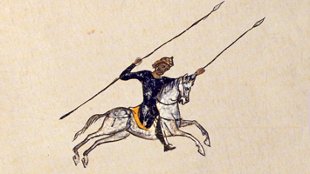
Song
A Nun With Child

Song
The Castle of the Beauty

Song
A Trader Made His Way

Song
Andrónikos and His Black Steed

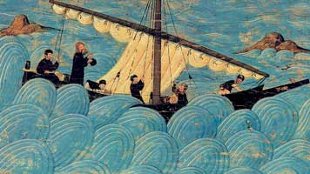
Song
I Want to Climb up to the Top

Song
Little Ship, Where Are You Going
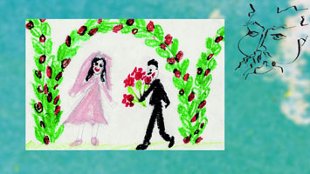
Song
My Royal-Born Pearl Pod
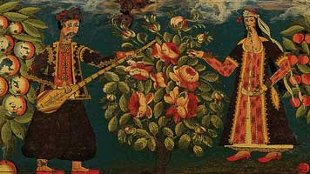
Song
River, Dear River of Mine

Song
So Many Lies

Song
The Lament of the Virgin (Mytilene)

Song
The Lament of the Virgin (Phourni)

Song
What Did I Do to You, My Sun
